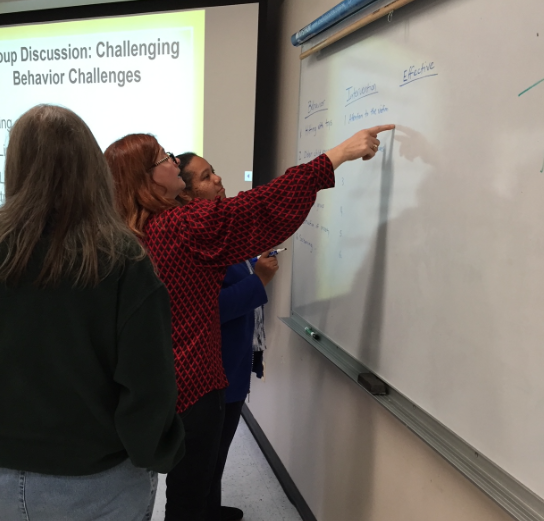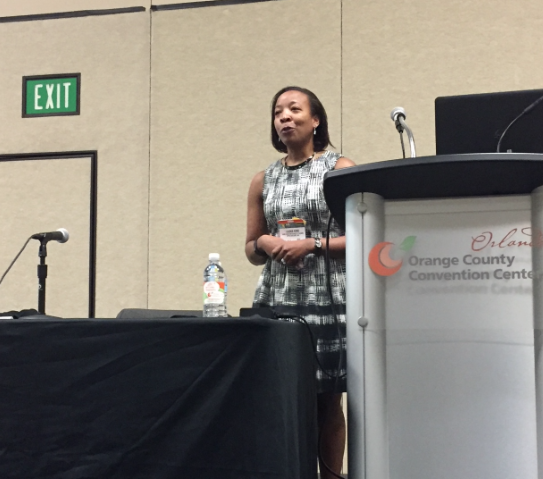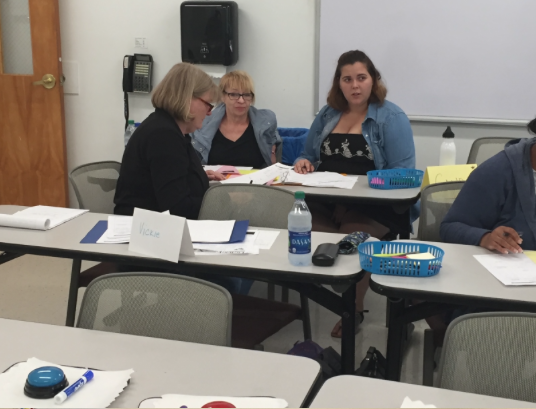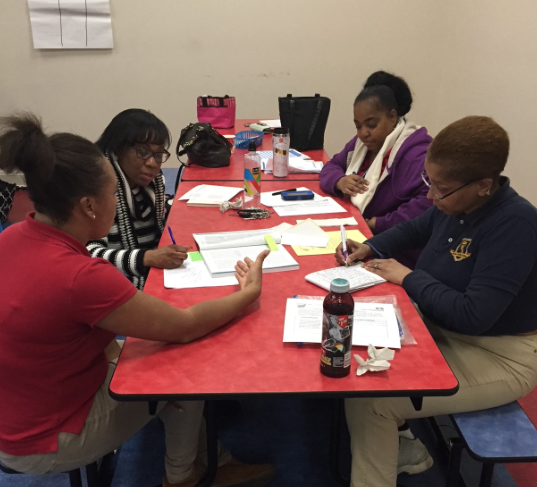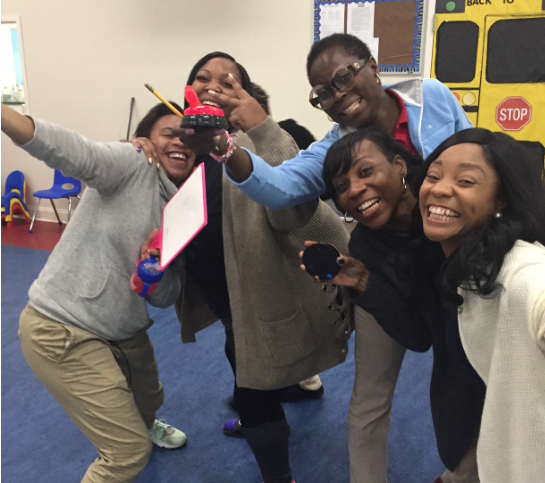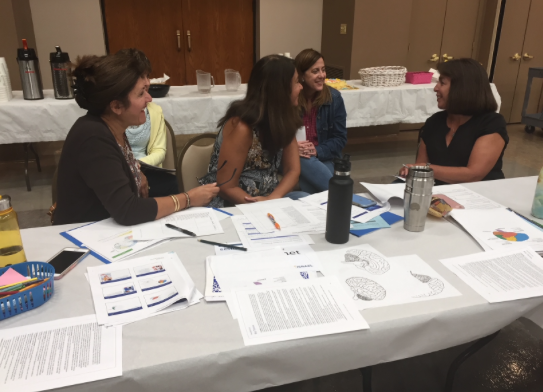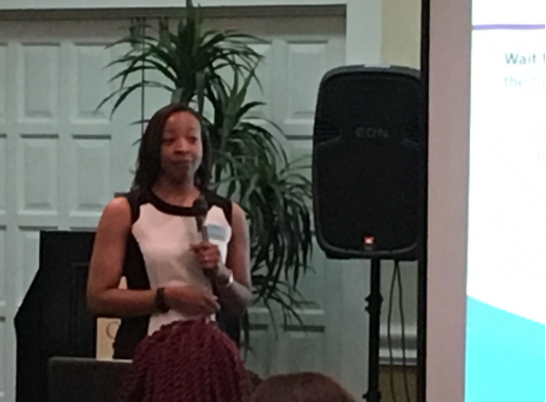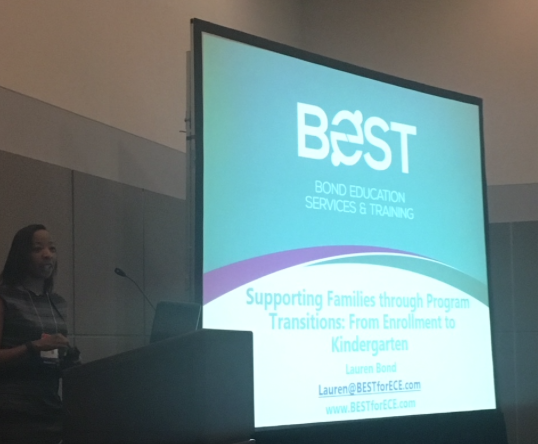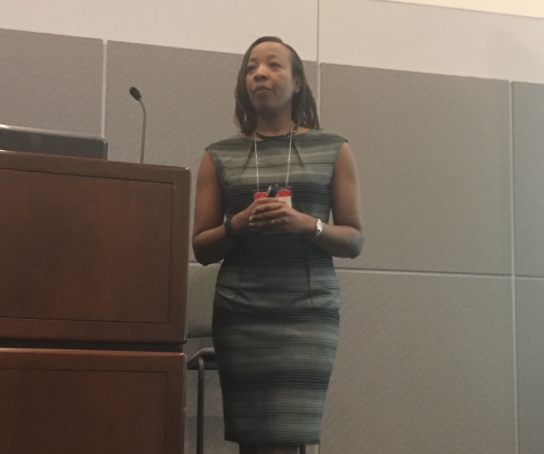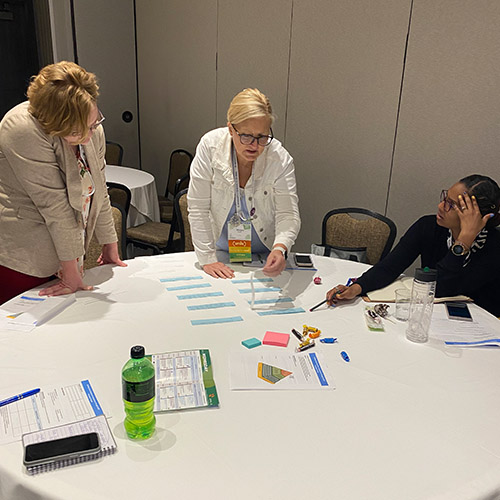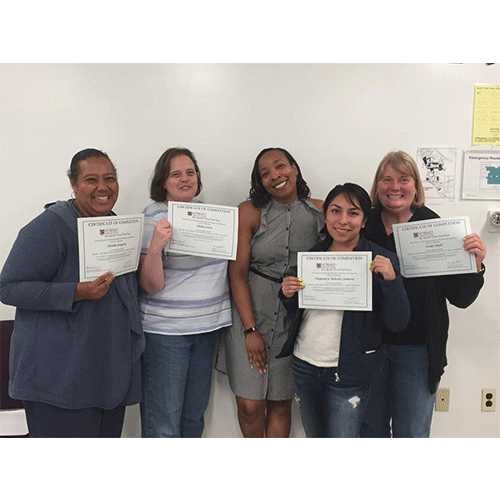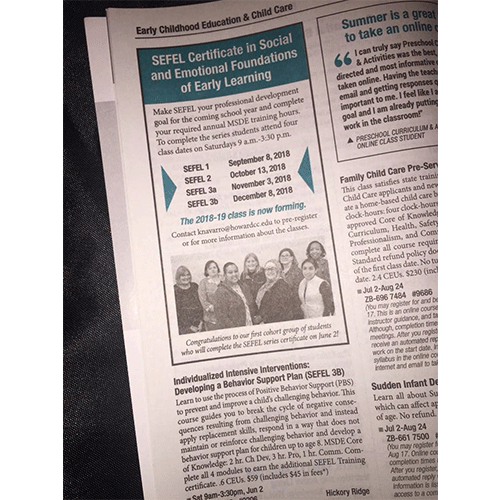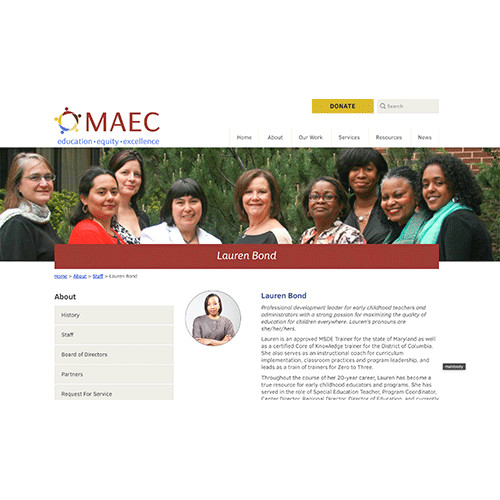Professional Workshops
We provide onsite training workshops to educators and programs that serve the early childhood education community. These trainings provide knowledge on best practices in Early Childhood Education and support the professional development of education professionals and program leadership as they strive to meet their goals and provide the best for children. We at BEST want to provide knowledge, techniques, and resources that are applicable to your programs. Trainings are designed for the adult learner who benefits from engaging, strategy focused, interactive, and fun training workshops. Our trainings meet the Maryland State Department of Education (MSDE), Office of Child Care Licensing requirements.
Does your program or organization have a conference coming up? BEST would like to partner with you to present at your conference. Lauren has presented at company based annual conferences in addition to the NAEYC Annual Conference. Workshops can be customized to meet the theme of the conference or the need of the participants. If you are interested in partnering with BEST for your conference please complete our Training Interest Form.
Training Workshops
closed
Environmental Factors that Support Engagement
Environmental Factors that Support Engagement
2 hrs. (CUR)
This interactive training guides educators to think about the environmental factors that support how they engage with the children within their classrooms. Educators will have the opportunity to think about their current practices and how they support children’s engagement and understanding of their learning and their environment. This training will cover concepts such as challenging behaviors, and how teachers can minimize and redirect those behaviors, they will explore the process of developing and implementing classroom rules and expectations, we will discuss different strategies for implementing successful classroom transitions and discover ways to maximize children’s interest by providing engaging materials and incorporating intentional facilitation of activities daily. The concepts in this training align with the Teachstone CLASS domain, Classroom Organization.
Instructional Strategies to Develop Inquiry, Knowledge, and Language
Instructional Strategies to Develop Inquiry, Knowledge, and Language
2 hrs. (CUR)
During this interactive training, educators will have the opportunity to examine the 4 C’s, (critical thinking, creativity, collaboration, and communication) and how they influence language, knowledge, and the interactions that take place daily with children. In addition, we will identify various types of questions, responses, and interactions that teachers can implement to promote higher level thinking in their children. We will also look at different strategies to support language development, as well as encourage conversations that facilitate critical thinking. The concepts in this training align with the Teachstone CLASS, domain, Instructional Support.
Supporting Positive Interactions with Children
Supporting Positive Interactions with Children
2 hrs. (CUR)
This interactive training is designed to support educators in creating a positive environment in which child-teacher interactions support growth and development. In this training, we will highlight strategies that can be used to build and sustain positive relationships with children. Educators will have the opportunity to discuss ways to be present, connected, and create opportunities to extend learning. In addition, we will spend time identifying opportunities, in which educators can be intentional in how they regard their children, by way of being flexible, supporting autonomy, and encouraging student expression. As educators experience this training, they will grow in their awareness of how to support the emotional and academic needs of their children. The concepts in this training align with the Teachstone CLASS, domain, Emotional Support.
Developing Equity in Early Childhood Education
Developing Equity in Early Childhood Education
12 hrs. PROF
Introducing the Developing Equity in Early Childhood Education four-part training series that provides leaders, administrators, and practitioners an opportunity to examine and address issues that impact equitable early childhood education (ECE). The series consists of four 3-hour modules that build on one another:
Module 1: Culture and Equity in Early Childhood Education
Orients participants to the foundational content that is necessary for deeper study of equity and its implications in ECE environments, including issues of human diversity that are broadly defined to include race, ethnicity, culture, nationality, religion, sexual orientation, gender identity, and ability. Participants will discuss identity and culture and reflect on their own cultural identity. They will also discuss equity and identity, as well as the difference between it and equality by reviewing and discussing real-life scenarios that involve issues of equity in ECE.
Module 2: Implicit Bias: Key Concepts
Explores the science of implicit bias and how implicit bias shows up in daily life and provides opportunities to practice strategies that interrupt implicit bias. This session emphasizes the impact of microaggressions and stereotypes that influence teaching and learning while working with children and families. Participants will engage with content that leads them to a common understanding of implicit bias and reflect on their own bias and that of others. Research studies involving bias and strategies to address bias in the workplace will be shared.
Module 3: Poverty and Privilege
Examines how social inequity leads to educational inequality and how educational inequities reproduce social inequality in the broader society. Participants will review the links between social and educational disparities and recognize the structural forces of injustice and how those forces contribute to unequal opportunities, experiences, and achievement outcomes for children and families along the lines of race/ethnicity, class, gender, and immigration status. Specific topics include poverty and privilege.
Module 4: Building Systems of Equity
Synthesizes the key outcomes from sessions one, two, and three and provides the foundational steps that need to be taken to build equity driven systems. Participants will end the series with a concrete equity goal and an action plan for success!
Supporting Maryland’s Multilingual Learners: WIDA Early Years
Supporting Maryland’s Multilingual Learners: WIDA Early Years Essential Actions Orientation
2 Hr. CD, 1 Hr. PROF
This presentation is based on the WIDA Essential Actions. The intent is to provide early educators with information they can use to support all children, particularly multilingual learners, their families, and their programs. This training is designed to encourage educators to implement equitable access to multilingual children to maximize their learning and development in both their home language and English language development. The orientation is required before providers take the additional trainings in the WIDA Early Years: Supporting Maryland’s Multilingual Learners Essential Actions series, and it provides the foundational knowledge about WIDA Early Years, asset-based approaches to instruction, and the WIDA Early Years Guiding Principles.
Supporting Maryland’s Multilingual Learners: WIDA Early Years Essential Actions 1 & 14
1 Hr. CD, 1 Hr. PROF
This presentation is based on WIDA Essential Actions 1 and 14. The intent is to provide early educators with information they can use to support all children, particularly multilingual learners, their families, and their programs. Essential Action 1 supports collaboration to ensure that all adults interacting with multilingual learners support multilingual development. Essential Action 14 provides for multiple and meaningful opportunities for multilingual learners to use their languages.
Supporting Maryland’s Multilingual Learners: WIDA Early Years Essential Actions 2 & 13
1 Hr. CD, 1 Hr. PROF
This presentation is based on WIDA Essential Actions 2 and 13. The intent is to provide early educators with information they can use to support all children, particularly multilingual learners, their families, and their programs. Essential Action 2 supports the gathering of information about dual language learners’ cultures and the languages heard and used in the past and present in order to support dual language development. Essential Action 13 promotes the use of language supports to help scaffold language development and learning.
Supporting Maryland’s Multilingual Learners: WIDA Early Years Essential Actions 3 & 4
1 Hr. CD, 1 Hr. PROF
This presentation is based on WIDA Essential Actions 3 and 4. The intent is to provide early educators with information they can use to support all children, particularly multilingual learners, their families, and their programs. Participants will understand how to recognize and use the strengths, resources and experiences of multilingual learners and their families to support and enhance language development & learning.
Supporting Maryland’s Multilingual Learners: WIDA Early Years Essential Actions 5 & 9
2 Hrs. CD
This presentation is based on WIDA Essential Actions 5 and 9. The intent is to provide early educators with information they can use to support all children, particularly multilingual learners, their families, and their programs. Essential Action 5 supports ways to apply information gathered about dual language learners, including their cultures, how they use language, their language development, strengths, and resources. Essential Action 9 supports designing language learning experiences with consideration for the sociocultural context.
Supporting Maryland’s Multilingual Learners: WIDA Early Years Essential Actions 6 & 8
2 Hrs. CD
This presentation is based on WIDA Essential Actions 6 and 8. Essential Action 6 intends to provide early educators with information they can use to support all children, particularly multilingual learners and their families, in their classrooms. Essential Action 6 supports how children develop and use the English language as well as how they continue to learn, use and value their own heritage languages. Essential Action 8 encourages Early educators to consider a variety of techniques to support multilingual learners and develop and create ways to design developmentally appropriate classroom environments which foster children’s learning during routines, social interactions, and other classroom experiences.
Supporting Maryland’s Multilingual Learners: WIDA Early Years Essential Actions 7 & 12
1 Hr. COMM, 1 Hr. PROF
This presentation is based on WIDA Essential Actions 7 and 12. The intent is to provide early educators with information they can use to support all children, particularly multilingual learners, their families, and their programs. Essential Action 7 supports the connection of language standards with early learning standards and guidelines to make curriculum accessible and meaningful for multilingual learners. Essential Action 12 supports the planning for language teaching and learning within specific areas of development and learning.
Supporting Maryland’s Multilingual Learners: WIDA Early Years Essential Actions 10 & 11
1 Hr. CUR, 1 Hr. CD
This presentation is based on WIDA Essential Actions 10 and 11. The intent is to provide early educators with information they can use to support all children, particularly multilingual learners, their families, and their programs. Essential Action 10 provides opportunities for multilingual learners to engage in higher level thinking. Essential Action 11 provides opportunities to identify the purposes of language used during routines and learning experiences.
Canvas of Learning: Classroom Displays & Documentation
3 hrs. CUR
This training will take a deep dive in to classroom displays and documentation. Teachers will be challenged to evaluate how they make learning visible to children and families. As we explore documentation we will examine it from the Reggio perspective. Teachers will consider when, why, and how they collect documentation. When others enter your classroom can they see the learning process, how you value the capabilities of children, authentic representations of the children, and how your environment supports the learner? What story is your classroom telling about you?
The Growing Brain: From Birth to 5 Years Old Series
The Growing Brain – The Basics (3 hrs. CD)
The goal of this workshop is for participants to understand how the brain grows and develops from conception through 5 years old. Participants will learn the names of different parts or regions of the brain and their functions; gain an understanding of how nerve cells communicate and connect; learn about neuroplasticity; and the role of early experiences in making connections between areas of the brain.
Training in this series can be done individually. You also have the option of completing all workshops as a full series by scheduling to complete all 7 workshops.
The Growing Brain – Factors Affecting Brain Growth and Development (3 hrs. CD)
The goal of this workshop is for participants to understand the key factors that affect brain development and how to support health brain development overall. Participants will identify factors that affect brain growth and development; understand how stress can affect brain development; and learn strategies (the 5 R’s) for supporting healthy brain development.
The Growing Brain – Communication and Language Development (1.5 hrs. CD, 1.5 hr. CUR)
The goal of this workshop is for participants to understand how communication and language skills develop in the first 5 years, the brain’s role in the development of these skills, and how to support them. Participants will learn about specific communication milestones and when they typically emerge and how this relates to brain development; learn strategies for supporting early communication skills; and gain an understanding of how Multilanguage learning occurs.
The Growing Brain – Cognition and Executive Function (3 hrs. CD)
The goal of this workshop is for participants to understand how young children develop cognitive and executive functions in relation to the developing brain. Participants will learn how cognitive development unfolds; ways to support cognitive development in young children; above executive functioning and its critical role in cognitive and overall development; and how to support the development of executive functions.
The Growing Brain – Social-Emotional Development (3 hrs. CD)
The goal of this workshop is for participants understand how social–emotional development unfolds in the first 5 years and the brain’s role in this process. Participants will gain an understanding of how Social–Emotional Development Unfolds in the First 5 Years and How to Support It in Young Children as well as the areas of the brain involved in social interactions and emotional reactions. Participants will also explore the role of relationships and attachment in social-emotional development; the effect of stress on social-emotional development; and the development of empathy in very young children.
The Growing Brain – Understanding Behavior (3 hrs. CD)
The goal of this workshop is for participants to understand how children’s behavior is influenced by the brain. Participants will learn about basic brain anatomy; connections between areas of the brain and how these connections are expressed through behavior; key factors that influence behavior; root causes of challenging behavior and effective strategies for helping children with these difficulties.
The Growing Brain – Play (2 hrs. CD, 1 hr. CUR)
The goal of this workshop is for participants to understand the stages and types of play that unfold in early childhood, the role of the brain in this process, and how to maximize children’s learning through play. Participants will learn about the development of play, the differences between free and guided play, and core skills children develop through play and how to promote these skills.
Pursuing the Leader in You
3 hrs. PROF
Leadership development is an essential component of professional growth. We recognize that effective leadership is vital to the success of education and care settings. Without skilled and committed leaders to help shape teaching and learning the opportunity to create and sustain a high-quality program is minimal. We will look at various aspects of leadership to include leadership styles, communication, leading versus managing, and supporting change to name a few. The goal of this workshop is to help you learn practical strategies and approaches for developing your own personal leadership capabilities and understanding how your professional growth as a leader can shift the atmosphere, culture and success of your program.
Supporting Maryland’s Multilingual Learners: WIDA Early Years
Supporting Maryland’s Multilingual Learners: WIDA Early Years Essential Actions Orientation
2 Hr. CD, 1 Hr. PROF
This presentation is based on the WIDA Essential Actions. The intent is to provide early educators with information they can use to support all children, particularly multilingual learners, their families, and their programs. This training is designed to encourage educators to implement equitable access to multilingual children to maximize their learning and development in both their home language and English language development. The orientation is required before providers take the additional trainings in the WIDA Early Years: Supporting Maryland’s Multilingual Learners Essential Actions series, and it provides the foundational knowledge about WIDA Early Years, asset-based approaches to instruction, and the WIDA Early Years Guiding Principles.
Supporting Maryland’s Multilingual Learners: WIDA Early Years Essential Actions 1 & 14
1 Hr. CD, 1 Hr. PROF
This presentation is based on WIDA Essential Actions 1 and 14. The intent is to provide early educators with information they can use to support all children, particularly multilingual learners, their families, and their programs. Essential Action 1 supports collaboration to ensure that all adults interacting with multilingual learners support multilingual development. Essential Action 14 provides for multiple and meaningful opportunities for multilingual learners to use their languages.
Supporting Maryland’s Multilingual Learners: WIDA Early Years Essential Actions 2 & 13
1 Hr. CD, 1 Hr. PROF
This presentation is based on WIDA Essential Actions 2 and 13. The intent is to provide early educators with information they can use to support all children, particularly multilingual learners, their families, and their programs. Essential Action 2 supports the gathering of information about dual language learners’ cultures and the languages heard and used in the past and present in order to support dual language development. Essential Action 13 promotes the use of language supports to help scaffold language development and learning.
Supporting Maryland’s Multilingual Learners: WIDA Early Years Essential Actions 3 & 4
1 Hr. CD, 1 Hr. PROF
This presentation is based on WIDA Essential Actions 3 and 4. The intent is to provide early educators with information they can use to support all children, particularly multilingual learners, their families, and their programs. Participants will understand how to recognize and use the strengths, resources and experiences of multilingual learners and their families to support and enhance language development & learning.
Supporting Maryland’s Multilingual Learners: WIDA Early Years Essential Actions 5 & 9
2 Hrs. CD
This presentation is based on WIDA Essential Actions 5 and 9. The intent is to provide early educators with information they can use to support all children, particularly multilingual learners, their families, and their programs. Essential Action 5 supports ways to apply information gathered about dual language learners, including their cultures, how they use language, their language development, strengths, and resources. Essential Action 9 supports designing language learning experiences with consideration for the sociocultural context.
Supporting Maryland’s Multilingual Learners: WIDA Early Years Essential Actions 6 & 8
2 Hrs. CD
This presentation is based on WIDA Essential Actions 6 and 8. Essential Action 6 intends to provide early educators with information they can use to support all children, particularly multilingual learners and their families, in their classrooms. Essential Action 6 supports how children develop and use the English language as well as how they continue to learn, use and value their own heritage languages. Essential Action 8 encourages Early educators to consider a variety of techniques to support multilingual learners and develop and create ways to design developmentally appropriate classroom environments which foster children’s learning during routines, social interactions, and other classroom experiences.
Supporting Maryland’s Multilingual Learners: WIDA Early Years Essential Actions 7 & 12
1 Hr. COMM, 1 Hr. PROF
This presentation is based on WIDA Essential Actions 7 and 12. The intent is to provide early educators with information they can use to support all children, particularly multilingual learners, their families, and their programs. Essential Action 7 supports the connection of language standards with early learning standards and guidelines to make curriculum accessible and meaningful for multilingual learners. Essential Action 12 supports the planning for language teaching and learning within specific areas of development and learning.
Supporting Maryland’s Multilingual Learners: WIDA Early Years Essential Actions 10 & 11
1 Hr. CUR, 1 Hr. CD
This presentation is based on WIDA Essential Actions 10 and 11. The intent is to provide early educators with information they can use to support all children, particularly multilingual learners, their families, and their programs. Essential Action 10 provides opportunities for multilingual learners to engage in higher level thinking. Essential Action 11 provides opportunities to identify the purposes of language used during routines and learning experiences.
Coaching for Growth
3 hrs. PROF
We all have the desire for our teams to grow professionally but we must learn the method of coaching rather than coaxing. Just as children need individualized support to learn, teachers need that same type of support and that can be accomplished with effective coaching. Coaches help teachers analyze their teaching and its impact on children. You want to be a coach that cultivates a habit in the teacher of continuously assessing and reflecting on what they can do to support children’s learning through promoting continuous self-assessment, developing new skills and improving existing knowledge. We will review the characteristics of coaching to include joint planning, observation, action, reflection and feedback. We will examine reflective practice strategies such as open-ended questions, interviews, self-assessments, observations, and videotaping. This workshop will grow you as a coach so you can better support the professional growth of the adults in your program.
Early Learning Assessment (ELA)
8 hrs. PROF, 4 hrs. CD
The Early Learning Assessment (ELA) is a tool teacher’s use with preschool-age children. Teachers use the tool to determine the current level of each child’s skills, knowledge and behaviors in the areas of Social Foundations, Language and Literacy, Mathematics, Science, Social Studies, Physical Well-Being and Motor Development, as well as the Fine Arts. The ELA is an ongoing formative assessment that gives teachers information to support the continuous growth of preschool-age children. The ELA promotes structure to help teachers’ document, analyze and make instructional decisions. Teacher’s make instructional decisions based on the information they collect while observing children over time. Teachers will be able to share a report with families that explains their findings and provide suggestions on activities families can do at home to continue to support children’s growth and development.
All participants must attend all 12 hours of the training and pass the content assessment and simulator in order to receive their certificate and implement the tool. As a reminder the ELA tool is used for children 36-72 months. It is recommended that all teachers for those age groups and the administrators that will be supporting them attend the training. Participant who are interested must complete the ELA Interest Form. Please list Lauren Bond as your preferred trainer in the comment section at the end of the form.
Pyramid Model for Preschool Classrooms
The Pyramid Model promotes healthy social-emotional development for children birth through age 5 years. These training provides teachers with illustrations and tools for implementing practices for promoting children’s social emotional competence and early literacy skills. The Pyramid Model framework promotes strategies to help teaching staff build positive relationships with and among children by creating supportive learning environments, teaching children to understand and express their emotions, and use problem solving skills. In addition, these trainings will guide teachers in providing targeted and individualized interventions to children with more intensive support needs.
Pyramid Model for Preschool Classrooms Mod 1- 6 hrs. CD
Building Relationships & Creating Supportive Environments
Pyramid Model for Preschool Classrooms Mod 2- 6 hrs. CD
Social Emotional Assessment & Targeted Social Emotional Strategies
Pyramid Model for Preschool Classrooms Mod 3- 6 hrs. CD
Intensive Interventions
Customer Service Leads to Customer Satisfaction
3 hrs. PROF
Customer service is a necessity for any business that wants to succeed and provide a high-quality customer experience. Customer service is about relationships so in the child care field we all play a part in providing quality service. In this workshop we will examine many facets of creating a customer centered program to include first impressions, telephone etiquette, communication, and addressing concerns. Customer service must be seen as an integral part of the daily operations of our programs and knowing such will create higher customer satisfaction and an overall positive experience for the entire program.
Pyramid Model for Infants and Toddlers Classrooms
Pyramid Model training is designed to support young children’s social and emotional development through a culturally sensitive approach that is responsive to the unique needs of programs, families, professionals and communities. These training focuses on promoting children’s social emotional competence, preventing challenging behaviors and strategies for addressing challenging behaviors. This training will prepare early education professional caring for infants and toddlers in the social emotional domain be embedding practices into already established schedules and routines.
Pyramid Model for Infants and Toddlers Classrooms Mod 1- 6 hrs. CD
Building Relationships & Creating Positive Environments
Pyramid Model for Infants and Toddlers Classrooms Mod 2- 6 hrs. CD
Targeted Social Emotional Strategies
Pyramid Model for Infants and Toddlers Classrooms Mod 3- 6 hrs. CD
Intensive Interventions
Basic Health & Safety Training
3 hrs. (HSN)
Basic Health & Safety Training is a “NEW” pre-service training requirement for all providers. The Health and Safety Training will cover specific topic areas that have been identified as critical for all child care providers to meet the requirement of the proposed licensing regulation regarding training in basic health and safety areas. Key topics for this training include: establishing safe & healthy environments, teaching all children safe practices to prevent and reduce injuries, proper sanitation practices and procedures, and identifying child abuse & neglect. Completion of this training does not meet regulatory requirements for specified training in Medication Administration, CPR / First Aid, or Emergency and Disaster Preparedness.
Developing Young Thinkers
3 hrs. (CUR)
Teachers are to create opportunities for children to stimulate their curiosity and engage with children in ways that extend their learning and ability to think critically. During this workshop participants will examine how higher level questioning and thought provoking language can influence a child’s thinking ability and communication skills. By incorporating a variety of methods into teacher-child interactions, lessons, and environment teachers can promote critical thinking, language development and elicit more information about how children think as they engage in play.
Enriched Learning Centers
3 hrs. (CUR)
Learning centers are an essential aspect of the classroom environment. This training will provide participants with the necessary information to set up well defined learning centers that will enhance their curriculum, increase classroom management, and provide children with adequate material to stimulate their overall development and educational experience within the classroom environment.
.
Including All Children and the Americans with Disabilities Act (ADA)
3 hrs. (SN)
This workshop will cover best practices for including all children in early childhood education and school age programs. Participants will be presented with information, strategies, and resources on how to develop and implement an ECE environment that is inclusive to all children and families.
Planting the Seed of Professionalism
3 hrs. (PRO)
Professionalism is an important aspect of our work environment. This training will inform participants of the importance of professionalism and the attributes that they can embrace as they grow professionally. Participants will have an opportunity to explore how the field of early childhood is advancing the early childhood professionals as they examine NAEYC’s Professional Standards and Competencies for Early Childhood Educators. Upon completing this training participants will have had to opportunity to reflect on their level of professionalism and understand how it plays apart in the image of the center, them as an individual and the field of early childhood.
Strengthening Business Practices Series (Child Care Center)
The purpose of this training series is to strengthen child care providers’ foundational knowledge of fiscal terms, concepts, and practices. It encourages providers to realize the importance of fiscal planning to the sustainability of their business operations. It provides tips and best practices to help break down fiscal processes into manageable steps.
Module I – Budgets, Projections, and Planning for Center-Based Child Care Providers
3 hrs. PROF
Come and learn the value of developing a budget and how to use it for decision-making throughout the year. We will look at ways to plan strategically by understanding how to project business costs and generate additional income.
Module II – Financial Reports and Internal Controls for Center-Based Child Care Providers
3 hrs. PROF
In this training, we will discuss financial reports and identify ways they can help you better manage your program’s finances. We will also become familiar with what internal controls mean in a center-based child care setting and how they can strengthen the fiscal health of your program.
Module III – Marketing Your Program for Center-Based Child Care Providers
3 hrs. PROF
What is marketing and why is it important? We will focus on marketing efforts that are both external and internal and discuss how program features and benefits can be used as marketing tools. Learn how data can inform marketing efforts in order to achieve greater success, become more cost effective, and use time more efficiently.
Module IV – Recruiting and Retaining Staff for Center-Based Child Care Providers
3 hrs. PROF
In this workshop, we will be discussing how to implement strategies to help you face the challenging topic of recruiting and retaining staff for your child care program.
Strengthening Business Practices Series (Family Child Care)
The purpose of this training series is to strengthen child care providers’ foundational knowledge of fiscal terms, concepts, and practices. It encourages providers to realize the importance of fiscal planning to the sustainability of their business operations. It provides tips and best practices to help break down fiscal processes into manageable steps.
Module I – Budgets, Projections, and Planning for Family Child Care
3 hrs. PROF
Come and learn the value of developing a budget and how to use it for decision-making throughout the year. We will look at ways to plan strategically by understanding how to project business costs and generate additional income.
Module II – Financial Reports and Internal Controls for Family Child Care
3 hrs. PROF
In this training we will discuss financial reports and identify ways they can help you better manage your program’s finances. Gain a better understanding of what internal controls mean in a family child care setting and how they can strengthen the fiscal health of your program.
Module III – Marketing Your Program for Family Child Care
3 hrs. PROF
What is marketing and why is it important? The purpose of this training is to strengthen your understanding of marketing tools, audiences, and elements necessary to develop a marketing plan. Learn to tailor your marketing practices to the audience you are trying to reach and develop effective communication strategies to promote your services.
Training Approval: CKO-154486 (exp. 11/1/23)



